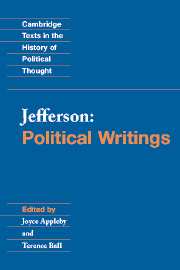Book contents
- Frontmatter
- Contents
- Preface
- Introduction
- Chronology
- Biographical synopses
- A note on sources
- Bibliographical note
- I A Private Man in Public Life
- II Natural Law, Natural Right, and Revolution
- III Self-government
- IV Moral Sense, Civic Education, and Freedom of the Press
- V The Constitutions of Virginia and France
- VI The U.S. Constitution
- VII Religious Liberty and Toleration
- VIII Political Parties
- IX Race and Slavery
- X Native Americans
- XI Women (not) in Politics
- XII Law of Nations
- XIII Innovation and Progress
- XIV Relations between Generations
- Appendices
- Index
- Cambridge Texts in the History of Political Thought
II - Natural Law, Natural Right, and Revolution
Published online by Cambridge University Press: 05 June 2012
- Frontmatter
- Contents
- Preface
- Introduction
- Chronology
- Biographical synopses
- A note on sources
- Bibliographical note
- I A Private Man in Public Life
- II Natural Law, Natural Right, and Revolution
- III Self-government
- IV Moral Sense, Civic Education, and Freedom of the Press
- V The Constitutions of Virginia and France
- VI The U.S. Constitution
- VII Religious Liberty and Toleration
- VIII Political Parties
- IX Race and Slavery
- X Native Americans
- XI Women (not) in Politics
- XII Law of Nations
- XIII Innovation and Progress
- XIV Relations between Generations
- Appendices
- Index
- Cambridge Texts in the History of Political Thought
Summary
A Summary View of the Rights of British America
[July 1774]
Est proprium munus magistratus intelligere, se gerere personam civitatis, debereque; ejus dignitatem & decus sustinere, servare leges, jura discribere, ea fidei suæ commissa meminisse.
cicero, De Of., l. 1. c. 34.It is the indispensible duty of the supreme magistrate to consider himself as acting for the whole community, and obliged to support its dignity, and assign to the people, with justice their various rights, as he would be faithful to the great trust reposed in him.
Resolved, that it be an instruction to the said deputies, when assembled in general congress with the deputies from the other states of British America, to propose to the said congress that an humble and dutiful address be presented to his Majesty, begging leave to lay before him, as Chief Magistrate of the British empire, the united complaints of his Majesty's subjects in America; complaints which are excited by many unwarrantable encroachments and usurpations, attempted to be made by the Legislature of one part of the empire, upon those rights which God and the laws have given equally and independently to all. To represent to his Majesty that these his states have often individually made humble application to his imperial throne to obtain, through its intervention, some redress of their injured rights, to none of which was ever even an answer condescended; humbly to hope that this their joint address, penned in the language of truth, and divested of those expressions of servility which would persuade his Majesty that we were asking favours, and not rights, shall obtain from his Majesty a more respectful acceptance.
- Type
- Chapter
- Information
- Jefferson: Political Writings , pp. 61 - 149Publisher: Cambridge University PressPrint publication year: 1999
- 1
- Cited by



